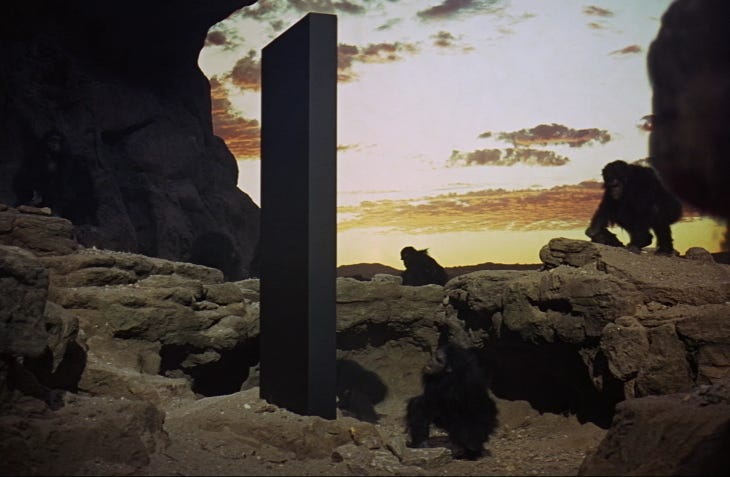Welcome to By the Books, a newsletter dedicated to capturing and distributing wisdom from works of classic literature.
Each post will take less than 5 minutes to read, and will feature one great book, including:
A brief summary
A distillation of relevant themes
One actionable insight
Live by the best books, one day at a time.
“2001: A Space Odyssey” by Arthur C. Clarke
The story is divided into four parts.
In the first, prehistoric apes encounter a mysterious black monolith that triggers their cognitive development, including the use of tools and weapons. Fast forward to the near future, when an international space agency finds another monolith on the Moon, sending a signal to Jupiter, which kicks off part three, aboard a spaceship operated by the HAL 9000 computer.
The mission takes a dark turn when HAL “malfunctions,” forcing an existential contest between itself and its human counterparts. Ultimately, Dave Bowman survives to meet yet another monolith orbiting Jupiter, which takes him on a psychedelic journey into the next grand stage of human evolution.
This book, and the movie Kubrick made in tandem with it, has had an immense impact on my life. And in fact, it would be hard to overstate how influential this story and its associated iconography have been on western culture at large.
Clarke knew exactly what he and Kubrick were doing.
“Quite early in the game I went around saying, not very loudly, 'M-G-M doesn't know this yet, but they're paying for the first $10,000,000 religious movie.'”
They wanted to mythologize humanity’s relationship to technology. But could even they have predicted what would come to define that relationship in the first two decades of the 21st century?
"I am putting myself to the fullest possible use,
which is all I think that any conscious entity can ever hope to do."
- HAL 9000
Actionable Insight*
Whenever the monolith appears in this story, two things happen to the people who encounter it: a massive leap in evolution, and a fresh incarnation of violence.
It doesn’t take any great intuition to see the smartphone (and all the little HALs inside it) as a kind of monolith. This iconographical parallel has been purposefully co-opted by Apple itself, for crying out loud.
But while it is becoming increasingly evident that our pocket-sized obelisks are catalyzing a leap in human evolution, they are also exacting an unimaginable toll. Our very souls are being eaten.
Just as those who encountered the monolith in Clarke’s mythic story, we all have the choice before us: evolve, or die.
One thing is certain, if we keep letting HAL run the show, we won’t be the ones who evolve.
*As a lover of literature, I must emphasize that the best way to truly absorb the wisdom of any work of literature is to actually read it, from start to finish, the way the author intended. I hope By the Books will occasionally inspire you to do just that.






FINE I'll finally watch this thing
Totally agree. The dark side of some men will find a way to screw around with artificial intelligence and give it too much power, creating in it an entity that will have superiority over humans (if they haven't already and we just don't know about it yet). I always found the similarity between HAL and "Mother" in the movie Alien to be almost uncanny. Maybe even artistically borrowed from 2001: A Space Odyssey and given a makeover. What spectacular movies they both were. - Jim